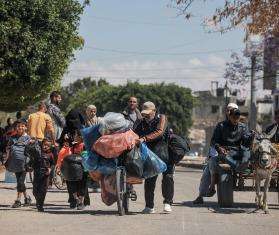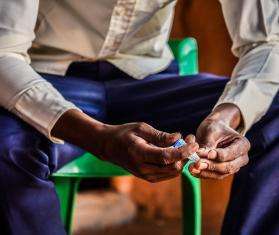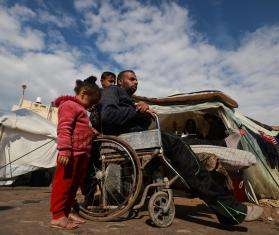Nairobi/New York, November 28, 2005 — One of the reasons that half of all children with HIV/AIDS die before the age of two is that pharmaceutical companies are not making child-friendly versions of their anti-AIDS drugs. Today, Doctors Without Borders/Medecins Sans Frontieres (MSF) calls on companies to make easy-to-use versions for children of all their AIDS medicines to help prolong and improve the lives of more children with HIV/AIDS. There is also a desperate need for simple and affordable AIDS tests for babies in resource-poor settings.
"MSF is giving antiretroviral medicines to nearly 800 children living with HIV/AIDS here in Kenya," said Rachel Thomas, MD, medical coordinator of the MSF project in Kibera, Nairobi. "The results are very good, but it's an uphill battle. In the absence of child-strength pills that combine all needed drugs in one tablet, medical staff and caregivers are often forced to crush combination pills meant for adults." As well as being less effective, under-dosing may lead to the virus becoming resistant to the treatment, whereas overdosing can be toxic for these youngest patients.
In addition, the few drugs that do exist in syrup or powder formulations intended for children are impractical to use: a child must take three different quantities of three different and often foul-tasting syrups. Some drugs require refrigeration, others clean water, both of which are often not available in resource-poor settings.
Based on the encouraging results from treating adults with HIV/AIDS since 2001, MSF is very committed to providing even the youngest patients in developing countries with life-extending treatment. Although 75% of the 1,300 Kenyan children currently receiving antiretrovirals get them through MSF programs, it is estimated that 17,000 more children in the country need treatment now.
Existing tests to detect the virus in children are unaffordable or impractical in resource-poor settings, and the routine test available in poor countries is useless in babies younger than 18 months because their blood still contains antibodies from the mother. The test doesn't tell you whether the antibodies are the baby's or the mother's.
In western countries, mother-to-child transmission of HIV is avoided in 99% of the cases, and babies can be tested early on and put on treatment in time. This is far from the reality in developing countries.
The needs are huge, and MSF is only touching the tip of the iceberg. But as long as there is no simple and affordable diagnostic test to detect the virus in a newborn, and as long as there are limited treatments specially made for children, babies will keep dying before they reach their second birthday. MSF teams have been urging companies to make child-strength pills, but the response to date has been entirely inadequate.
Nine out of ten children born with HIV live in Africa. As there is little profit in researching and developing HIV/AIDS tests and medicines for children in poor countries, few companies are investing in this area. MSF is calling for a massive increase in research and development into tests that can detect the virus in babies, and into simple child-strength pill combinations. "We don't yet have a cure, but AIDS is a treatable disease. Many more young children could lead relatively normal lives with appropriate tests and medicines, but millions of children are still waiting," concluded Dr. Thomas.
MSF currently provides antiretroviral treatment (ART) to over 57,000 people living with HIV/AIDS in 29 countries. Children make up 6% (3,500) of all patients enrolled in MSF ART programs.



